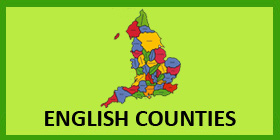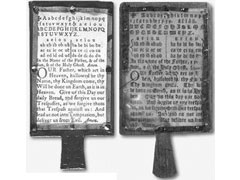




Back to the Intro Page







Writing had started to become very important. This was how merchants kept their records. People would write with a goose or bird feather dipped in ink. Once on the paper, the ink would be dried with fine sand. They would write on parchment which would be folded when finished. Wealthy lords would seal the parchment with their own wax stamp so the person receiving it knew it hadnít been opened. Hornbooks were handwritten parchment stuck on blocks of wood and covered with panels of transparent cow horn (the cling film of the day). There were no banks so people converted their money into gold plate or jewellery which they could sell if needed or use to show off how wealthy they were. There were 100 holy days each year when no one was allowed to work. Holy days is where we get the word holidays. Often, during these, a travelling fair might come to a town. These could last up to three weeks. There would be minstrels singing the latest hits, jugglers, fire-eaters, sword-swallowers, acrobats, musicians, traders with their exotic wares, fortune-tellers and, believe or not, doctors ready to cure your ills with their special potions. Actually these might have a good chance of killing you. Some of the entertainers would come from abroad. Finally you would have buffoons which are what we would call clowns. Sounds like a fun three weeks. By the way, 100 days with no work equals about 14 weeks holiday a year. Sounds owlingly good to me.
Back to the Plantagenets Again Hoots - CultureForward to the Tudors Hoots - Culture

